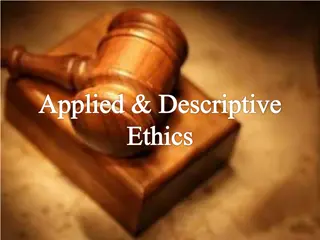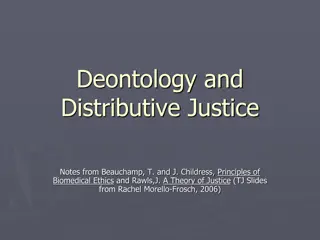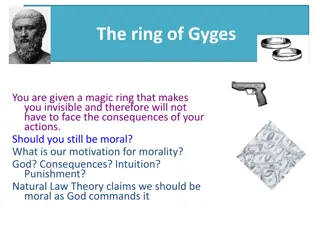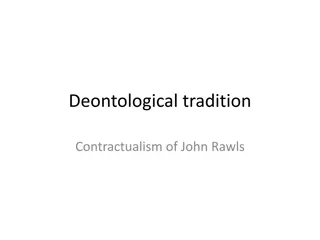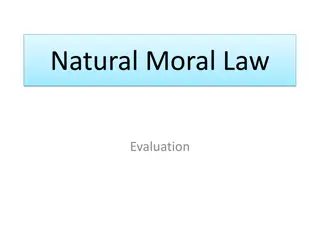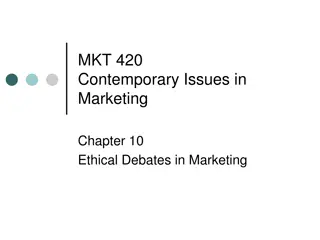Understanding Human Values, Ethics, and Ethical Frameworks
Human values and ethics play a crucial role in guiding individual behavior and decision-making. Human values encompass aspects such as respect, integrity, responsibility, fairness, compassion, honesty, trustworthiness, and cooperation. Ethics provide broader guidelines for determining right and wron
3 views • 7 slides
Exploring Ethics: Branches, Theories, and Moral Dilemmas
Ethics delve into Meta Ethics, Normative Ethics, and Applied Ethics to understand moral concepts and decision-making. The discourse covers various ethical theories like Absolutism, Relativism, Subjectivism, and explores the difference between Teleological and Deontological decision-making. Thought-p
5 views • 14 slides
Understanding Applied and Descriptive Ethics in Practical Scenarios
Applied ethics focuses on ethical questions in real-life situations and professions, addressing controversial issues like abortion, euthanasia, and more. Philosophers in this field analyze moral problems using ethical theories such as utilitarianism and deontological ethics to make ethical decisions
0 views • 20 slides
Deontology and Distributive Justice in Ethics
Deontology, rooted in the concept of duty, focuses on morally required, forbidden, or permitted choices. It emphasizes obedience to duty, opposing utilitarian claims. Unlike virtue theories, deontology prioritizes what is right over an overall conception of good. Immanuel Kant's categorical imperati
0 views • 32 slides
Understanding Natural Law Theory: Morality and Divine Commands
Natural Law Theory, influenced by thinkers like St. Thomas Aquinas and Aristotle, posits that morality is derived from rational thought and divine commands. The theory emphasizes the importance of following moral absolutes to establish a right relationship with God and achieve eternal life. By study
1 views • 36 slides
Understanding Human Values, Ethics, and Ethical Frameworks
Human values and ethics play crucial roles in guiding human behavior and decision-making. Values such as respect, integrity, responsibility, fairness, compassion, honesty, trustworthiness, and cooperation are fundamental in shaping individual interactions with others and society. Ethics provide broa
1 views • 7 slides
Understanding John Rawls' Contractualism and the Deontological Tradition
Explore John Rawls' Contractual Theory of Justice within the deontological tradition. Rawls introduces the original position and the veil of ignorance to establish fair and impartial principles of justice. Discover Rawls' principles of justice, focusing on basic liberties, social and economic inequa
0 views • 9 slides
Evaluation of Natural Moral Law: Absolutism, Relativism, and Ethical Considerations
The evaluation of Natural Moral Law explores the contrast between relativism and absolutism, highlighting the advantages and disadvantages of a deontological approach. It discusses how NML provides universal moral truths, clear answers in times of uncertainty, and sets boundaries for ethical behavio
0 views • 22 slides
Exploring Marketing Ethics and Theoretical Frameworks
This chapter delves into the complex realm of marketing ethics, examining definitions, standards of conduct, and ethical debates prevalent in the marketing industry. It tackles the scope and role of marketing ethics, along with specific ethical topics such as societal impact, decision-making models,
0 views • 12 slides
Forms of Moral Reasoning and Ethics in Decision-Making
Explore the main forms of moral reasoning in ethical decision-making, including virtue ethics, deontological reasoning, and teleological reasoning. Understand the importance of developing ethical virtues and principles in guiding behavior. Delve into examples of reasoning from virtue and deontologic
0 views • 28 slides


